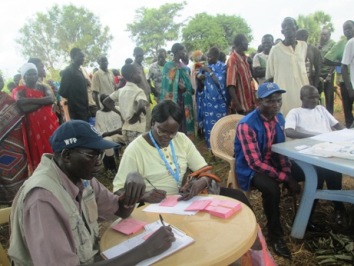Displaced S. Sudanese accuse rebels of blocking humanitarian access
January 26, 2015 (MABOR) – It’s been alleged that thousands of internally displaced people (IDPs) in South Sudan’s Jonglei state are being blocked from accessing humanitarian assistance by rebel forces led by former vice-president Riek Machar.

They claim rebel commanders are preventing civilians attempting to enter government-controlled areas in search of food.
Duk county’s Pagak and Pajut, as well as areas bordering Uror county to the east are currently under rebel control.
Many displaced people arriving in Pajut have complained that their movements have been restricted by Colonel Chol Thon Tuol, a rebel officer serving at the border.
Tuac Chuol Ayual, a Dinka man from Pajut said he was blocked from entering government-controlled areas to receive humanitarian assistance.
He finally arrived in Poktap on Friday after a three-day journey along with other families from Pajut.
“We had been closely watched by the soldiers of Colonel Tuol, who always checked on us to find out if there was a new face in our houses. If any new person is found he is always killed because they considered them as spies,” said Ayual.
More than 1,000 families have gathered in Poktap, which is under government protection, and are now waiting to receive humanitarian assistance.
Achol Gatwei Reath lost her cattle and other belongings after she was forced to flee Pajut when rebel forces accused her of leaking information to her husband who serves in the South Sudanese army (SPLA).
Reath says she was questioned several times about why her husband refused to join the rebel group.
She says she was also accused of passing on sensitive military information to her husband despite having no mobile phone coverage or access to other means of communication.
“We had no network to use [the] phone in Pajut so that I communicate with my husband, and we had no access to other means of communications, but the rebels came to my house several times questioning me about why my husband refused to join them. They said I also leaked their military secrets to the SPLA, and I stay near to them,” she said.
“I gave out some cattle to bail my self out of their hands to stay free when I was cordoned and confined tightly in my house. I was not given [a] chance to look after my cattle and goats. They confiscated the same animals from me, so I had to escape to this place,” she added.
Manyiel Lual, who is more than 90 years old, also fled to Poktap, making the difficult journey with some of his grand children.
“I had not eaten food for the last 13 months. I survived on green leaves and wild fruits collected by my grand daughters,” said Lual.
“I had no blanket or sheet to cover myself and it had been very cold for an old man like me,” he added.
He also accused rebel forces of stealing cattle and raping women.
Family members already in Poktap celebrated Lual’s arrival, including one of his sons, a local area chief in the IDP camp.
Lual has called on rebel forces to allow civilians to move freely between government and opposition-controlled areas to obtain essential food and non-food items regardless of their tribal background.
Meanwhile, another group of young men said they hid in the bush during the day, returning to their homes at night for supplies to avoid detection by rebel forces.
“We moved in a group. At about 10 o’lock in the night we used to come back to our homes, eat and drink and then sleep. Earlier at 4 o’clock in the morning we moved out to the bush with our guns,” Chol Tut, one of the group’s members, said.
“When we became tired, we decided to come to Panyagoor and stayed there. Then we asked our parents to escape too, and last week we met here, in Poktap,” he added.
Government and rebel forces have been engaged in armed conflict since December 2013 after a political dispute in the country’s ruling SPLM party turned violent.
The crisis has reignited tribal tensions, with the fighting pitting troops loyal to president Salva Kiir, who hails from the Dinka tribe, against rebel forces, mainly of Nuer ethnicity.
The ongoing conflict has plunged the country into a humanitarian crisis, with aid agencies warning of severe food shortages.
(ST)
